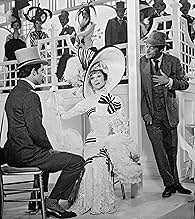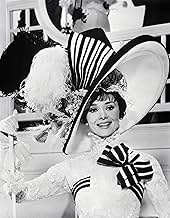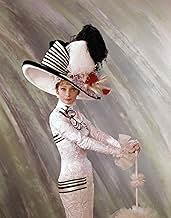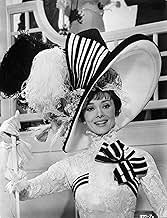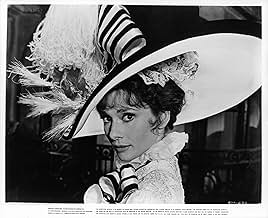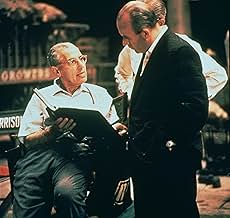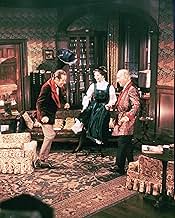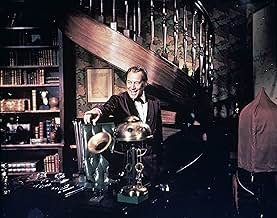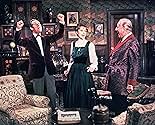Un professeur de phonétique misogyne et snob accepte le pari de transformer une vendeuse de fleurs et la rendre présentable dans la haute société.Un professeur de phonétique misogyne et snob accepte le pari de transformer une vendeuse de fleurs et la rendre présentable dans la haute société.Un professeur de phonétique misogyne et snob accepte le pari de transformer une vendeuse de fleurs et la rendre présentable dans la haute société.
- A remporté 8 oscars
- 26 victoires et 13 nominations au total
Elizabeth Aimers
- Cockney
- (uncredited)
Helen Albrecht
- Ascot Extra
- (uncredited)
John Alderson
- Jamie - Doolittle's crony
- (uncredited)
Mary Alexander
- Cockney
- (uncredited)
Gertrude Astor
- Cockney
- (uncredited)
LaWana Backer
- Ad Lib at Church
- (uncredited)
Walter Bacon
- Ball Guest
- (uncredited)
Best Picture Winners by Year
Best Picture Winners by Year
See the complete list of Best Picture winners. For fun, use the "sort order" function to rank by IMDb rating and other criteria.
Histoire
Le saviez-vous
- AnecdotesCostume designer Cecil Beaton created 1,500 costumes for this movie, with the exception of the pearl white gown Hepburn wears to the Embassy Ball, an original Edwardian specimen Beaton found in an antique shop.
- GaffesWhen Prof. Higgins sings "An Ordinary Man" he turns on several phonographs, seconds later he turns off one of them but all of the sounds stop.
- Citations
Eliza Doolittle: The difference between a lady and a flower girl is not how she behaves, but how she is treated.
- Générique farfeluIn the posters, playbills and the original cast album for the stage version of "My Fair Lady", the credits always read "based on Bernard Shaw's 'Pygmalion' ", letting the audience know what play "My Fair Lady" was actually adapted from. The movie credits simply read "from a play by Bernard Shaw".
- Autres versionsIn the remastered version of the film, some of the scene changes are changed from sudden cuts to wipe outs, as they probably were when the film was released. When CBS Fox released it on video originally, they were changed to sudden cuts.
- ConnexionsFeatured in Toast of the Town: Episode #18.17 (1965)
- Bandes originalesWhy Can't the English?
(1956) (uncredited)
Music by Frederick Loewe
Lyrics by Alan Jay Lerner
Performed by Rex Harrison, Wilfrid Hyde-White, and Audrey Hepburn
Commentaire en vedette
I have read in a great many places (including the IMDb) that Henry Higgins is a misogynist. It has also been said that the film is a misogynist's fairy tale. Anyone saying this has clearly not watched this film too closely.
First, Higgins is not a misogynist. A misogynist hates women. What Higgins is, in reality, is a misanthrope. A misanthrope basically dislikes and distrusts everyone! Watch the film and you'll notice that Higgins treats everyone with the same disregard-Col. Pickering, Eliza's father, his own mother-everyone receives his rather cynical disdain. Some of the minor characters come off being treated worse than the principals do. It's simply more noticeable with Eliza because it's more frequent, it's newer with Eliza because the other principal characters have known Higgins longer and thus take it in stride. The myth that Higgins is a misogynist is perpetuated by the song, "Why Can't A Woman Be More Like a Man?".
Second, it can hardly be called a misogynist's fairy tale. If that were the case, I doubt Alfred Doolittle would have cause to sing, "Get Me To the Church On Time", as he'd hardly be getting married. His life is just as "ruined" as Eliza's by his encounters with Higgins, just as altered as her life has been.
This is a great musical, a good movie and it was even better as the original play by Shaw. Well worth seeing. Recommended.
First, Higgins is not a misogynist. A misogynist hates women. What Higgins is, in reality, is a misanthrope. A misanthrope basically dislikes and distrusts everyone! Watch the film and you'll notice that Higgins treats everyone with the same disregard-Col. Pickering, Eliza's father, his own mother-everyone receives his rather cynical disdain. Some of the minor characters come off being treated worse than the principals do. It's simply more noticeable with Eliza because it's more frequent, it's newer with Eliza because the other principal characters have known Higgins longer and thus take it in stride. The myth that Higgins is a misogynist is perpetuated by the song, "Why Can't A Woman Be More Like a Man?".
Second, it can hardly be called a misogynist's fairy tale. If that were the case, I doubt Alfred Doolittle would have cause to sing, "Get Me To the Church On Time", as he'd hardly be getting married. His life is just as "ruined" as Eliza's by his encounters with Higgins, just as altered as her life has been.
This is a great musical, a good movie and it was even better as the original play by Shaw. Well worth seeing. Recommended.
- llltdesq
- 27 déc. 2003
- Lien permanent
Meilleurs choix
Connectez-vous pour évaluer et surveiller les recommandations personnalisées
Détails
- Date de sortie
- Pays d’origine
- Site officiel
- Langue
- Aussi connu sous le nom de
- Moja draga dama
- Lieux de tournage
- Stage 16, Warner Brothers Burbank Studios - 4000 Warner Boulevard, Burbank, Californie, États-Unis(Ascot & Ballroom scenes)
- société de production
- Consultez plus de crédits d'entreprise sur IMDbPro
Box-office
- Budget
- 17 000 000 $ US (estimation)
- Brut – États-Unis et Canada
- 72 560 711 $ US
- Fin de semaine d'ouverture – États-Unis et Canada
- 354 764 $ US
- 17 févr. 2019
- Brut – à l'échelle mondiale
- 72 684 726 $ US
- Durée2 heures 50 minutes
- Couleur
- Mixage
- Rapport de forme
- 2.20 : 1
Contribuer à cette page
Suggérer une modification ou ajouter du contenu manquant

Lacune principale
By what name was My Fair Lady (1964) officially released in India in Hindi?
Répondre






